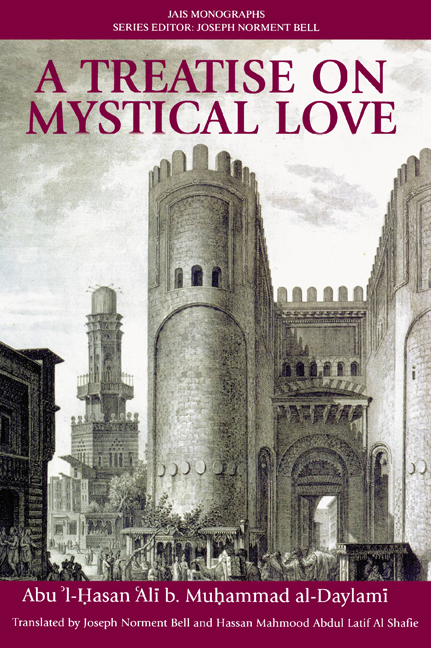Book contents
- Frontmatter
- Contents
- Dedication
- Acknowledgments
- Introduction
- Manuscript title page in English
- Author’s Preface
- I On the Chapters of the Book
- II May the Word cIshq Be Applied to Love for God and from God?
- III Preliminary Considerations
- IV On the Word Love, Its Derivation, and Its Meanings
- V On the Origin and Beginning of Love and Eros
- VI On the Essence and Quiddity of Love
- VII On the Diverse Views People Hold about Love
- VIII On the Description and Character of Eros
- IX On Praiseworthy Love
- X On Those Who Disparaged Love for Some Cause
- XI On the Effects of Love [and Eros] and Their Signs and Symptoms
- XII On the Signs of Love, Including the Sayings of Unimpeachable Spiritual Authorities among the Mystics and the Righteous
- XIII On the Classification of Love according to Our Opinion
- XIV On the Signs of God’s Love for Man
- XV On the Explanation of the Signs of Man’s Love for God
- XVI On the Signs [of the Love] of Those Who Love One Another in God
- XVII On the Love of the Elite among Believers
- XVIII On the Love of the Commonality of Muslims
- XIX On the Love of All Other Animate Beings
- XX On the Meaning of the Word Shahid
- XXL On the Definition of the Perfection of Love
- XXII On Those Who Died of Natural Love
- XXIII On Those Who Killed Themselves for Love
- XXIV On the Death of Divine Lovers
- Bibliography
- Index of Persons, Peoples, and Places
Introduction
Published online by Cambridge University Press: 01 October 2020
- Frontmatter
- Contents
- Dedication
- Acknowledgments
- Introduction
- Manuscript title page in English
- Author’s Preface
- I On the Chapters of the Book
- II May the Word cIshq Be Applied to Love for God and from God?
- III Preliminary Considerations
- IV On the Word Love, Its Derivation, and Its Meanings
- V On the Origin and Beginning of Love and Eros
- VI On the Essence and Quiddity of Love
- VII On the Diverse Views People Hold about Love
- VIII On the Description and Character of Eros
- IX On Praiseworthy Love
- X On Those Who Disparaged Love for Some Cause
- XI On the Effects of Love [and Eros] and Their Signs and Symptoms
- XII On the Signs of Love, Including the Sayings of Unimpeachable Spiritual Authorities among the Mystics and the Righteous
- XIII On the Classification of Love according to Our Opinion
- XIV On the Signs of God’s Love for Man
- XV On the Explanation of the Signs of Man’s Love for God
- XVI On the Signs [of the Love] of Those Who Love One Another in God
- XVII On the Love of the Elite among Believers
- XVIII On the Love of the Commonality of Muslims
- XIX On the Love of All Other Animate Beings
- XX On the Meaning of the Word Shahid
- XXL On the Definition of the Perfection of Love
- XXII On Those Who Died of Natural Love
- XXIII On Those Who Killed Themselves for Love
- XXIV On the Death of Divine Lovers
- Bibliography
- Index of Persons, Peoples, and Places
Summary
As nearly as can be determined, the major literary activity of Abū ʾ1- Hasan ʿA1ī b. Muḥammad al-Daylamī belongs to the latter quarter of the tenth century A.D. His Kitāb ʿatf al-alif al-maʾ lūf ʿalā al-lām al-maʿṭūf is one of the earliest extant treatises on mystical love in Arabic literature. The work represents a Sunni spirituality grounded in the teachings of al- DaylamT's master Ibn Khafif of Shiraz (d. 371/982), but it reveals what may be the remnants of Shiite influence in certain of the author's expressions.In some of its theoretical passages the work is indebted to the doctrine of the extremist mystic al-Ḥusayn b. Manṣūr al-Ḥallāj, who was executed for his controversial teachings in 309/922. Although al- Daylamī's text propounds a mysticism that includes Hallajian elements and makes room for a certain notion of union of the mystical lover with God, it seems to repudiate outright al-Hallaj's ecstatic claims to identity with the divine essence. The book gives a well-rounded picture of the religious, philosophical, and literary trends of the author's time as these are reflected in theoretical discussions about love, both sacred and profane, and in the author's selection of anecdotes, poetry, and hagiographi- cal literature relevant to the topic. In addition, through its many valuable citations of authorities from prior generations, the text helps explain how the ideas it deals with developed in early Islamic society.
Although now surviving in only one known manuscript, the work appears to have exercised a profound and continued influence, directly and indirectly, on the later mystical tradition in Shiraz. This influence is most clearly evident in the writings of Rūzbihān Baqlī, who died in 606/1209, or some two hundred years after al-Daylamī. Perhaps al-Daylamī's work was also of some significance for the subsequent literary flowering of Persian mysticism, a matter continuing research on Rūzbihān Baqlīmay help to elucidate.
THE AUTHOR
Life and Times
Biographer of his teacher Ibn Khafîf and perpetuator of the memory of many scholars and mystics whose names would otherwise have remained unknown, al-Daylamī himself, though repeatedly cited by later biographers of the city of Shiraz, ironically receives no biographical notice in any of the published biographical works we have consulted.
- Type
- Chapter
- Information
- A Treatise on Mystical Love , pp. xi - lxxPublisher: Edinburgh University PressPrint publication year: 2020



